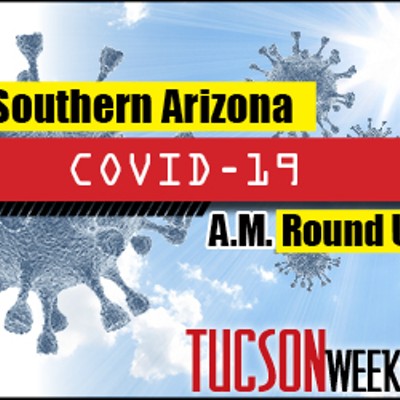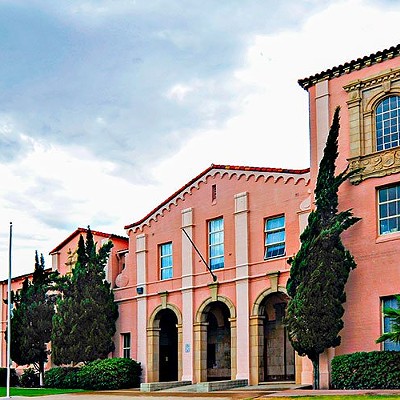The one constant over those 10 years has been the service of Joel Ireland and Mary Belle McCorkle. Neither of them is up for re-election this year, but there are four candidates for two positions: incumbent Rosalie Lopez, who is an Ireland/McCorkle critic, and challengers Bruce Burke, Adelita Grijalva and Cindy Schiesel.
When asked to rate the performance of Superintendent Stan Paz in his $202,000-a-year job, Burke lists both positives and concerns while Grijalva thinks he has done what he has been directed to do by the board. Schiesel said she believes Paz has a good heart, but is trying to make the district a business, and she doesn't think children are products.
Lopez assesses the superintendent an overall D- grade, pointing specifically to his involvement with the Paul Felix fiasco ("Sex Ed," June 13). In that messy case, Lopez and another board member were purposely kept out of the decision-making loop by Ireland, McCorkle and Paz. "He blatantly lied to me at the direction of the majority," Lopez says, and gives Paz an "F" for trustworthiness.
The others running for the board also lament the Felix incident. Grijalva calls it "back-door and sneaky," Schiesel says it was handled illegally and Burke said it was a serious error in judgment.
To repair the board, Grijalva hopes two new people are elected while Schiesel thinks it is important for all-around respect to return to the district. For his part, Burke sees the sometimes dysfunctional school district family as needing to pull together. If she is part of a new majority, Lopez believes TUSD will really turn a corner.
In interviews and at a recent public forum, both Lopez and Schiesel displayed detailed knowledge of the district. Plus, neither was afraid to take a specific stand on what needs to be done to fix it.
First elected four years ago, with an assist from the Tucson Weekly, Lopez takes pride in a decreasing dropout rate. At the same time she is an outspoken critic of some of TUSD's policies and programs.
Lopez thinks the district clearly breaks the law in how it allocates its court-ordered $56 million desegregation budget, citing as one example the annual spending of $52,000 to pay two locksmiths who work districtwide. Instead, she wants to reprioritize these and other deseg funds for literacy, tutoring and counseling programs.
While noting she makes many unanimously approved motions, Lopez is best known for her sometimes heated disputes with the current board majority over the district's budget, the TUSD legal department and personnel matters. She says she won't support other board members when they employ their buddies in administrative positions, calling it a corruption of the hiring process.
Lopez also points out that the TUSD administrative staff equals one job for every seven teachers, while the norm is 1 to 17. To change that, she has proposed eliminating a dozen positions, calling them "fluff."
Lopez has obviously done her homework on the TUSD budget. But her ill-fated run for the Board of Supervisors against Raúl Grijalva two years ago, combined with the perception of many that she is a political loose cannon, may harm her chance for re-election.
Diminishing Cindy Schiesel's potential for victory is her decision to limit her campaign spending to under $500. In a race where name recognition is so important, that might be extremely costly.
Having retired in 1999 after 32 years as an English teacher at Palo Verde High School, Schiesel sees TUSD going downhill from what was once an "incredibly good" district. To change that, she wants to drop some programs, like the $476,000 Project Pass, which she calls a diploma mill. "We should put money where it belongs, with real students in real classrooms," she says.
She also offers the interesting idea that local charter schools should share in teaching some alternatively educated students. In addition, Schiesel points out that in the last 20 years TUSD's enrollment has increased by 5 percent, but its administrative budget by 35 percent, and hopes a portion of that money can be spent on helping teachers and students instead.
"I'm pro-teacher because I'm pro-student," Schiesel says. "Teachers want safe classrooms and enough money to survive. Students want a reason to learn." Through her low-budget campaign she is seeking to get that message out.
Adelita Grijalva brings to the campaign a well-known name, enough funds to put signs up around town and political acumen. At a recent gathering of the candidates, while her opponents sat silently, she worked the crowd, hugging supporters and even kissing a baby.
The product of TUSD schools and daughter of Congressional candidate Raul Grijalva, however, is vague about what exactly she would do if elected. She does feel TUSD administration is top-heavy, but offers no specific reduction proposals. As for the district's desegregation budget, she says generally, "It must be held more accountable. It should be used for the programs it was designed for."
Grijalva lists three priorities: ensure budget accountability, improve the board's relationships without assessing blame to individuals and provide more financial resources to children. She believes that last can partially be accomplished at no cost through cooperative efforts with city and county governments.
As for the current board, Grijalva says, "There is no one on it I could vote with even 75 percent of the time. They've lost focus." Concerning the district's administrative hiring process, she adds, "I don't like the system because it is so political. I'm not supportive of appointing people's [buddies]. Instead, we should decide who is the best qualified."
Attorney Burke, parent of a TUSD student and 25-year resident in the district, thinks some on the current board "are more interested in attacking the other members or the administration than in attacking the district's problems." In order to diminish conflicts, Burke favors allowing any board member to place an item on the agenda, a process which is now tightly controlled by Ireland, McCorkle and Paz.
He admits to not having detailed knowledge about either the district's administrative budget or the desegregation program, and is noncommittal about his spending plans. But Burke does say, "The administrative budget may not stand if it is top-heavy."
Concerning the seemingly endless round of evaluation tests that today's students are subjected to, Burke comments, "Teachers have to spend more time on paperwork than on teaching. That needs to change." In parodying the federal government's "Leave No Child Behind" program, he quips that he doesn't support a system where children are tested so many times simply to ensure that no child goes untested.












